Caring for Alzheimer's at Home: A Compassionate Approach
Caring for someone with Alzheimer’s can be a difficult experience, but it doesn’t have to be faced alone.

Home Instead provides specialised in-home services that are tailored around the specific needs of each person living with this condition.
This blog post looks at how home care offers advantages to both individuals with dementia and their families by exploring ways of structuring effective plans for practical assistance within familiar settings.

Key Takeaways
- Understanding Alzheimer’s Disease and its impact involves recognising signs, and taking action to create a care plan after a diagnosis.
- In-home elderly care provides personalised attention, and the ability to maintain routines & hobbies while allowing them to remain in a familiar environment.
- Help deciding between in-home or residential care – considering the needs of individuals with Alzheimer’s for their comfort & safety.

Understanding Alzheimer's Disease and Its Impact
Family members of a person with dementia should be familiar with its signs, symptoms and development in order to provide the necessary care.
With an accurate diagnosis, families can call Home Instead to start creating effective plans for their loved one’s care while safeguarding their independence and quality of life.
Although many choose residential facilities as they advance through Alzheimer’s stages, plenty still want to remain at home where all activities are familiar among those who mean most to them.
Our Care Professionals can assist when any risk arises. Which gives families the support they need. This includes both physical help and emotional comfort, which ensures safety throughout the process until control is regained.
Early signs and symptoms
In the early stages of Alzheimer’s, memory loss and confusion can show through via difficulty in recalling past conversations or events. Misplacing things into strange spots as well as struggling with common activities are also evident signs to look out for.
Providing necessary health care along with a good support system helps provide proper management for these symptoms to aid people living with this condition and navigate daily life accordingly.
Recognising such indicators is essential. This is so that proper attention is given to the individual’s particular situation, which will ultimately make life easier during more challenging times.
Progression of Alzheimer’s
As dementia progresses, the development of Alzheimer’s disease usually takes place in three stages: early, middle and late.
This deterioration typically occurs over a period of 8 to 10 years although it can take up to 20 years for some individuals.
To make sure they are taken care of during this time, both legally and financially, adjustments need to be made regularly depending on how far along their condition has come as memory loss increases which requires greater assistance with daily tasks too.
Related dementia symptoms also become more noticeable throughout the middle stage, necessitating extra support going forward along with an adapted care plan so that overall well-being is safeguarded at all times.
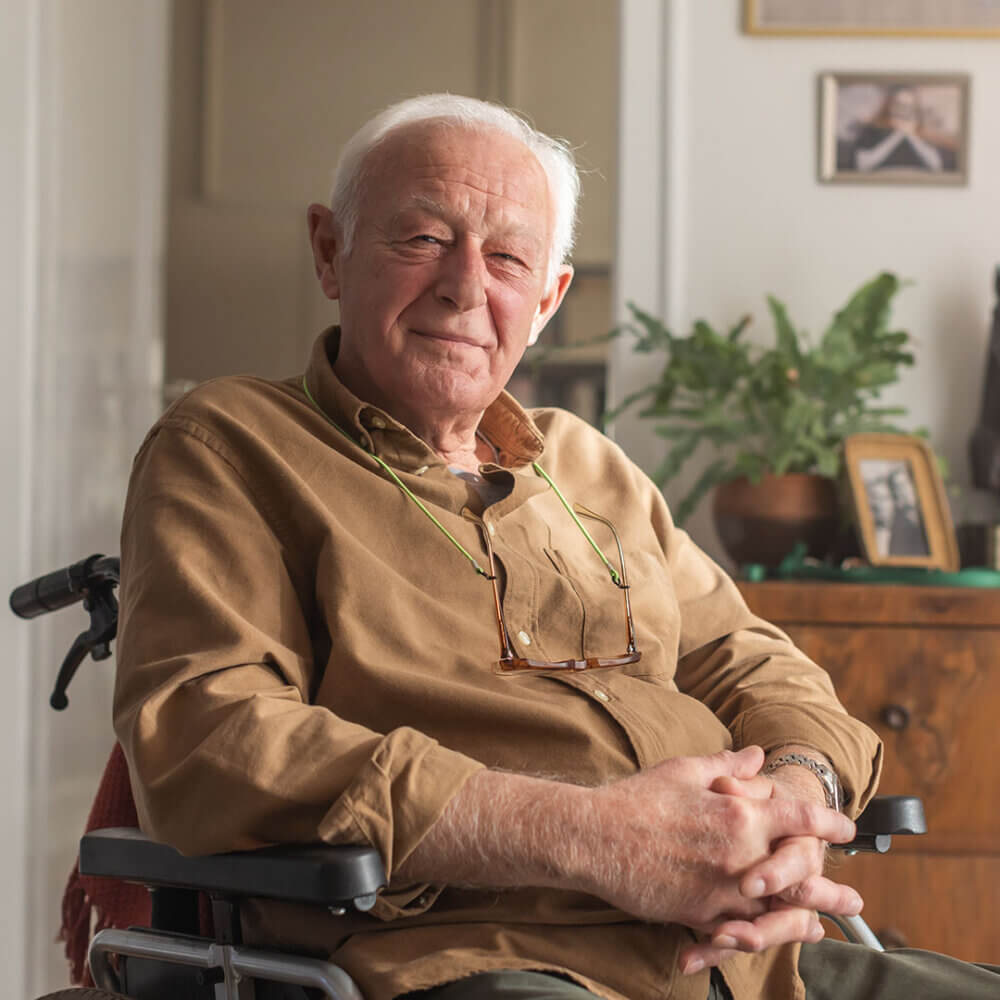
The Advantages of In-Home Care for People with Alzheimer's
At Home Instead, we are dedicated to providing in-home care for People with Alzheimer’s that provides them with a sense of comfort and stability through familiarity.
We also offer personalised services tailored to the person’s specific needs, helping promote their independence while supporting overall wellness.
This type of home care is incredibly beneficial not only for those living with dementia but also as support to family members acting as caregivers, giving all parties involved greater peace of mind knowing their loved one will be cared for properly.
Familiar environment
Providing support to those living with Alzheimer’s is vital for their well-being.
Here are the 3 main ways this can be achieved:
- Maintaining a familiar routine
- Safeguarding existing relationships
- Creating a comforting atmosphere through the use of colours and textures in their home environment.
These strategies help reduce anxiety while also stimulating memories which can slow down its progression over time and assist them in maintaining a sense of self amidst the condition they live with daily.
Ultimately, it allows these people to stay connected to what surrounds them on an emotional level despite any physical changes that may occur due to the disease.
Personalised care
In-home care strives to provide a personalised approach for individuals with Alzheimer’s that recognises their individual histories, personalities and interests.
By using local resources, this service seeks not only to safeguard the physical health of those living with dementia but also to promote activities which maintain independence.
Clinical trials have been conducted regarding person-centred interventions. These tests suggest reductions in agitation levels as well as symptoms related to neuropsychiatric illnesses while simultaneously promoting an improved quality of life.
In plain English, focusing on someone’s specific requirements and choices concerning care and everyday tasks can drastically affect both you (the diagnosed) and your loved ones in making life a little easier.
Choosing home care means families don’t have to move their loved ones to a care home, but still get the support they need. But remember, it is about more than just addressing medical needs. It provides emotional well-being too!
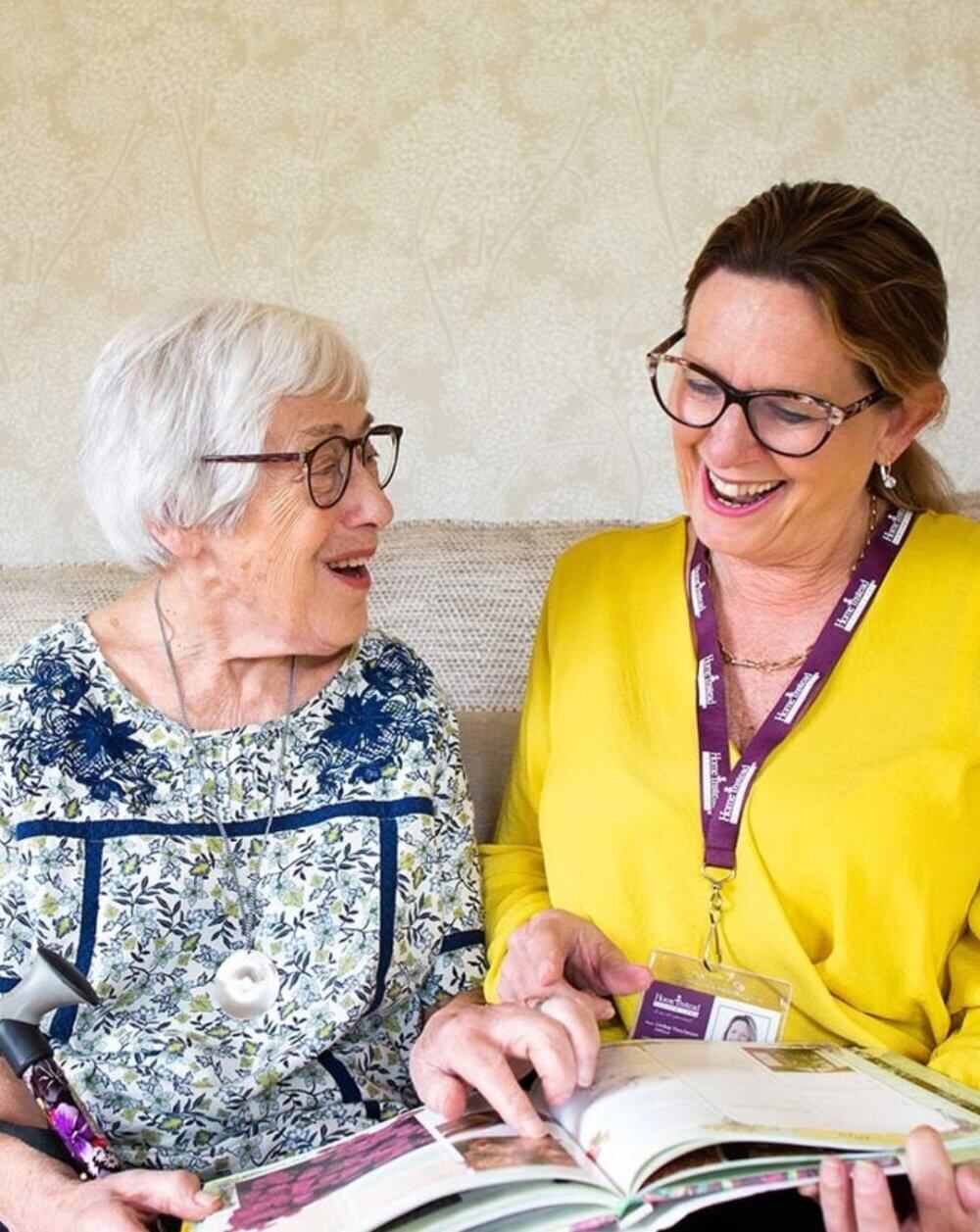
Comprehensive In-Home Services Provided by Home Instead UK
Home Instead offers a range of in-home services designed to give personalised care and support to People with Alzheimer’s, as well as their caregivers.
Personal care
Home Instead Care Professionals provide personal care assistance to People with Alzheimer’s in the comfort of their own homes.
This includes helping with daily living needs such as bathing, dressing and medication management while also ensuring that they keep up a high standard of hygiene and preserve their dignity.
These trained professionals can offer support for more specialised requirements like catheter care or PEG feeding if needed. With this personalised service, Home Instead enables individuals living with dementia to maintain autonomy even when dealing with a daily routine that is hard for them to manage alone.
Companionship
Home Instead provides companionship services to aid those living with Alzheimer’s, enhancing their well-being and reducing feelings of loneliness.
Care Pros can engage in recreational activities, helping stimulate cognitive functions while creating a sense of routine and familiarity in their lives, managing symptoms and improving quality.
Through offering emotional support as well as social interaction, these visits provide vital comfort during difficult times for people with dementia diseases such as Alzheimer’s.
Home Help Assistance
Home Instead provides Home Help to ensure that individuals with Alzheimer’s can focus on their well-being instead of day-to-day tasks. And for their families to spend more time doing fun activities with loved ones.
The service includes light housekeeping, meal preparation and transportation services. Care Professionals assist by cleaning up messes or doing laundry as well as providing nutritious meals which create a supportive space for both the people with dementia and families.
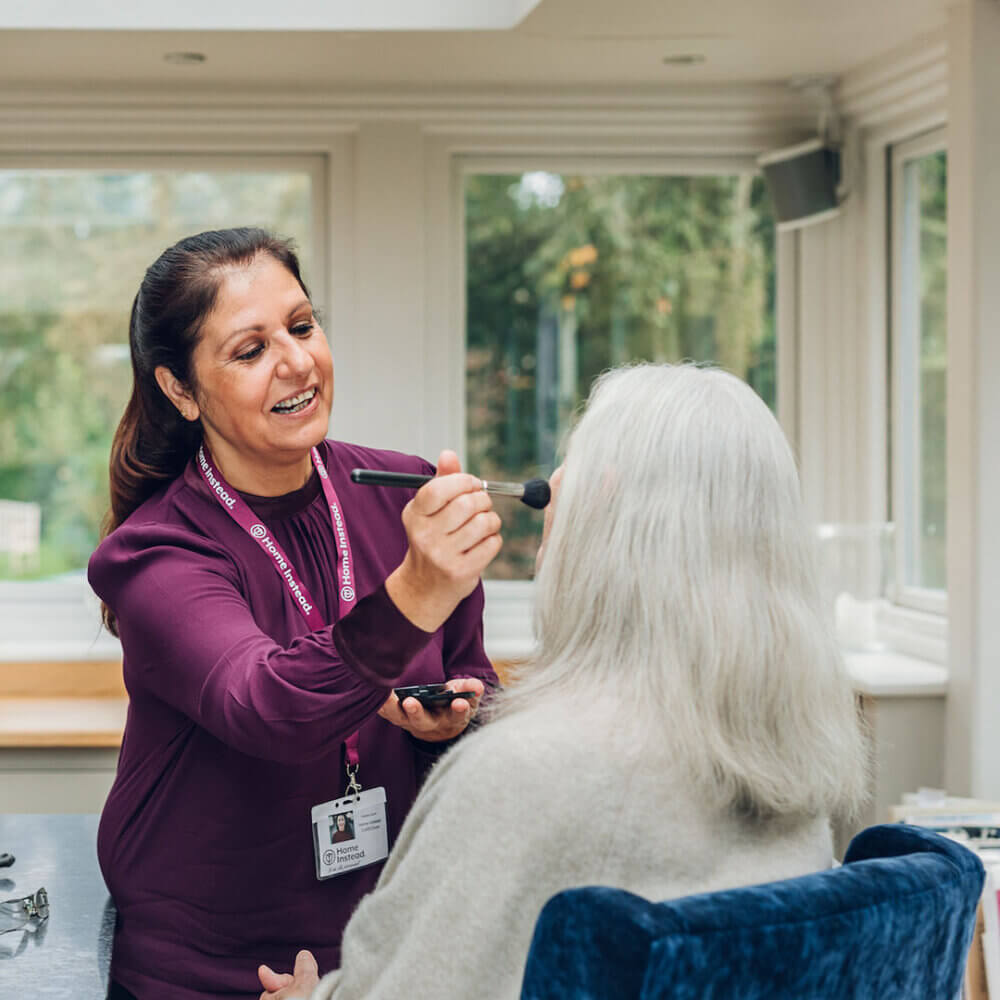
Planning and Executing Effective Alzheimer's Care at Home
When it comes to providing effective Alzheimer’s care at home, family members and caregivers must create a secure environment that ensures safety while also setting up routines with activities catered towards promoting cognitive stimulation and engagement.
This way the person living with Alzheimer’s can benefit from independence and positive well-being through fulfilling tasks that appeal to them such as puzzles or art projects, socialising with friends/family, and participating in physical activity, all of which are tailored specifically for their needs.
Creating a safe environment
We can promote the well-being and physical safety of their loved one with Alzheimer’s by providing a secure living space. This involves eliminating any risks, supervising to prevent mishaps and offering suggestions on modern gadgets such as alarms or memory prompts/reminders. With these steps taken into account to develop an environment friendly for them, anxiety levels are decreased while permitting independence at home too.
Establishing routines and activities
Our Care Professionals can provide a structured environment that promotes independence and well-being by crafting a personalised care plan tailored to the needs of their loved one living with Alzheimer’s. This daily agenda will incorporate enjoyable activities, offering the individual an opportunity for purposeful accomplishment while providing them with emotional connections that contribute positively to their overall well-being. By carefully considering what brings pleasure and success in life, our Care Professionals can create routines which enhance the quality of life for those impacted by this disease.
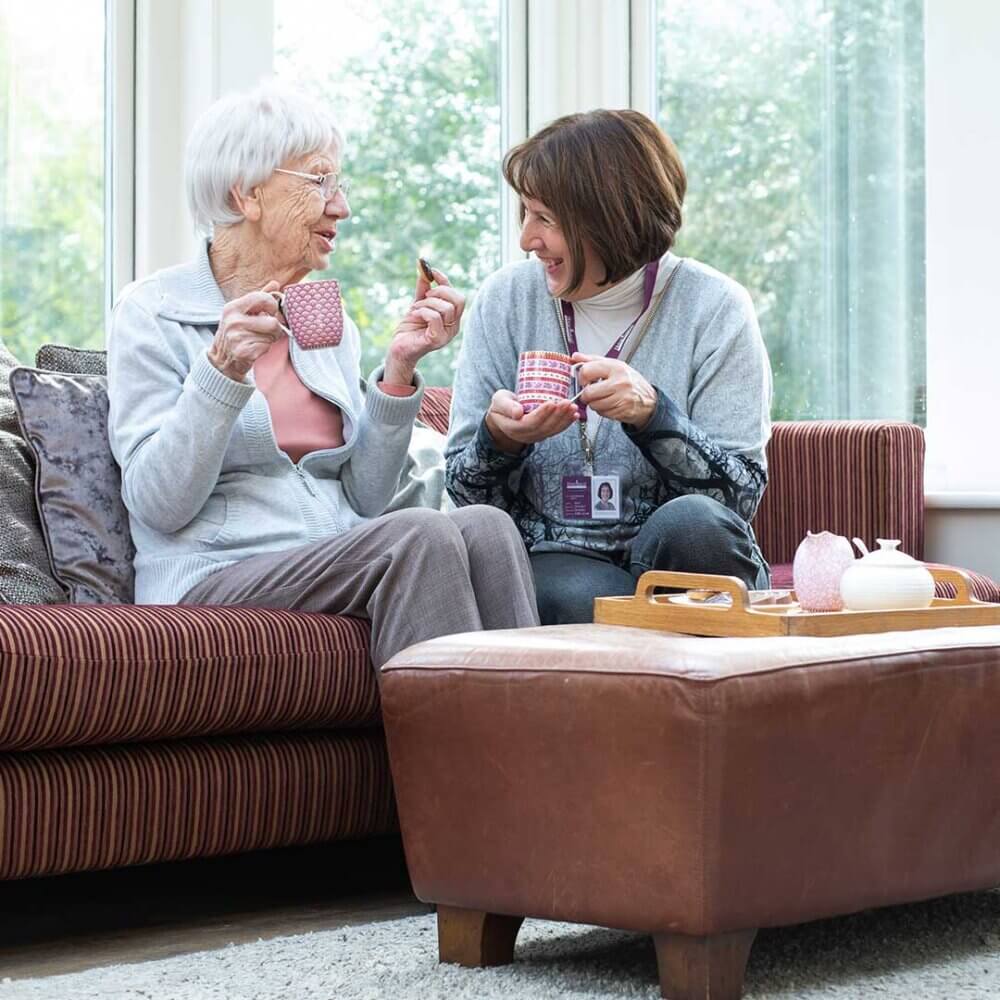
Professional Support for Family Caregivers
Family caregivers need access to professional support to both care for their loved one with Alzheimer’s and protect their own well-being. Respite care can provide them with needed relief, while caregiver training ensures that they are knowledgeable about how best to look after the person. By seeking assistance from a qualified care provider, family members can guarantee the highest quality of support for those affected by dementia as it reinforces an environment of compassion and understanding between all parties involved.
Having these services available allows families extra space so that they may attend to not only physical but also mental needs, such is necessary when offering long-term loving companionship during this difficult journey.
Respite care
Home Instead provides respite care services to ensure that family caregivers can take a break from caring for their loved one with Alzheimer’s, allowing them the opportunity to rest and recharge. This helps prevent burnout while also ensuring that the person is looked after in a secure setting. It is beneficial not only for them, but it also creates an environment of support between caregiver and receiver, which positively impacts both parties’ overall well-being.

In-Home Elderly Care as an Alternative to Residential Care
Many families will go through the process of what the best option is for elderly care; in-home or care home.
- Home Instead’s in-home care is an advantageous alternative to residential care.
- With your loved one receiving care in their familiar surroundings, and while still engaging in routines, living with beloved pets and hobbies they enjoy, will significantly improve their quality of life.
- Taking into consideration financial implications as well as what level of support is needed combined with any individual preferences will enable families to make a knowledgeable decision about which type of care works most effectively for them.
Benefits of in-home elderly care
Families who choose home care for their loved one with Alzheimer’s can have specialised support that enhances their loved one’s quality of life while also strengthening family bonds.
In-home elderly care has several advantages, such as the personalised attention and the ability for individuals to stay in a familiar environment where they can continue everyday routines and hobbies. But these benefits not only benefit the person but also bring peace of mind to the family by allowing them to keep track of their conditions more closely.
Making the decision
When it comes to picking between in-home and residential care for individuals with Alzheimer’s, several factors need to be taken into account:
- The type of care needed
- Financial implications
- Preference of said person – Respectful consideration should always be given to their wishes when choosing one option over another.
By keeping these aspects in mind while looking at all that Home Instead has to offer with our homecare services, families can make an educated decision.

Frequently Asked Questions
What not to do when caring for someone with Alzheimer’s?
When looking after a person with Alzheimer’s, provide them some autonomy in their life. Show respect towards their personal space and keep any items that make them feel secure nearby. Refrain from contradicting or debating them, inquiring about memories they might have forgotten or reminding them of deceased relatives who had been close to them, as well as topics which could cause distress. Concentrate more on current matters than questions concerning past events.
When is it time to put People with Alzheimer’s in a home?
When the needs of a senior with dementia become too great for you to manage on your own, and it begins taking its toll mentally or physically, relocating them into residential care may be their best option. Taking professional help can sometimes outweigh any other considerations if what is in the elderly person’s greatest interest is at stake.
What are the early signs and symptoms of Alzheimer’s disease?
Early diagnosis of Alzheimer’s disease is key, as memory loss, confusion and shifts in behaviour or mood are all indicative symptoms.
How does Alzheimer’s disease progress over time?
Alzheimer’s disease is a progressive illness that begins with mild symptoms and increases over time, necessitating more care. As the condition progresses through its three stages, those affected by Alzheimer’s will experience worsening of their symptoms.
What are the benefits of in-home care for People with Alzheimer’s?
In-home care for people living with Alzheimer’s is a great way to ensure their independence and overall well-being as it provides personalised support in the familiar comfort of home.
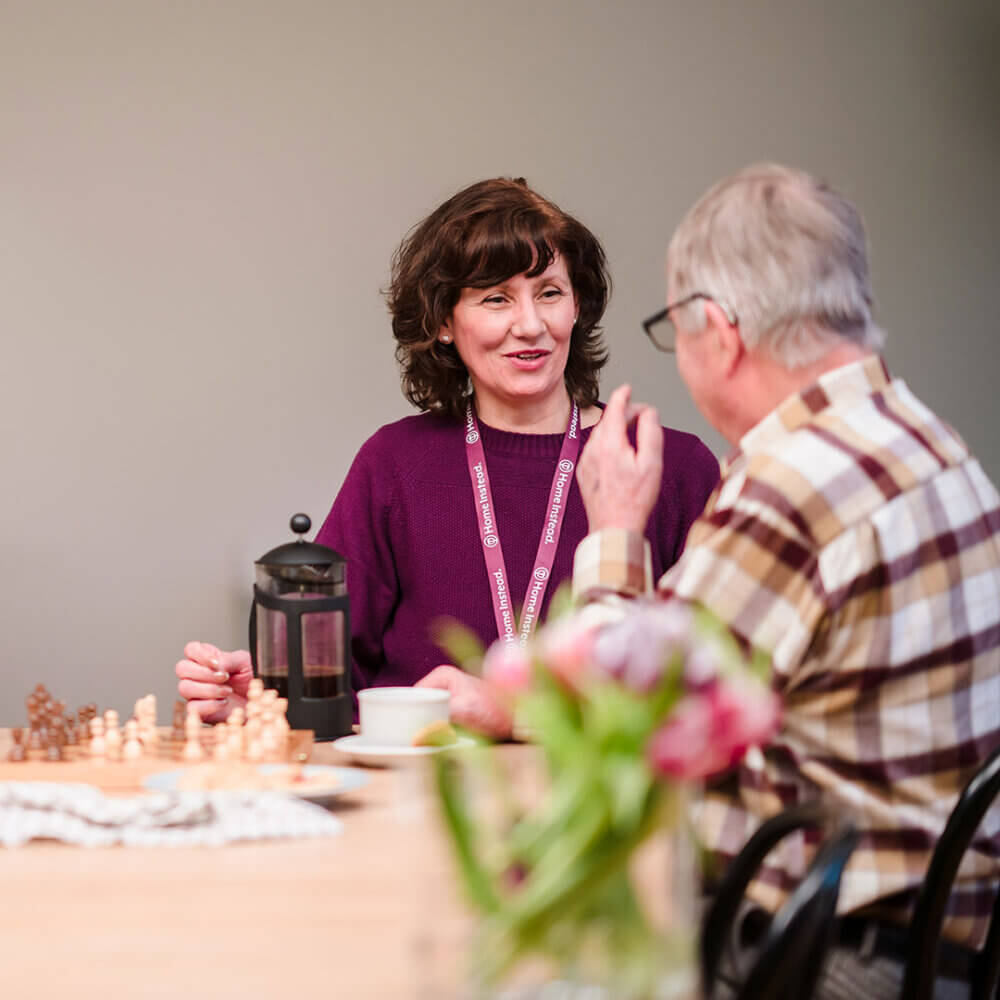
Areas We Serve
Hamilton, Uddingston, Motherwell, Bothwell, Strathaven, Bellshill, Rutherglen, Cambuslang & the surrounding areas
G71 5, G71 6, ML2 7, ML4 3, ML1 3, ML1 2, ML2 0, ML4 1, ML4 2, G72 6, G73 5, G71 8, G72 9, G73 4, G71 7, ML1 1, ML1 4, G72 0, ML2 8, ML1 5, G72 8, G72 7
Unit 2 Brandon House Business Centre, 23-25 Brandon St, Hamilton ML3 6DA, UK
01698 532002